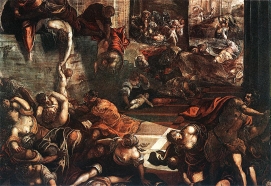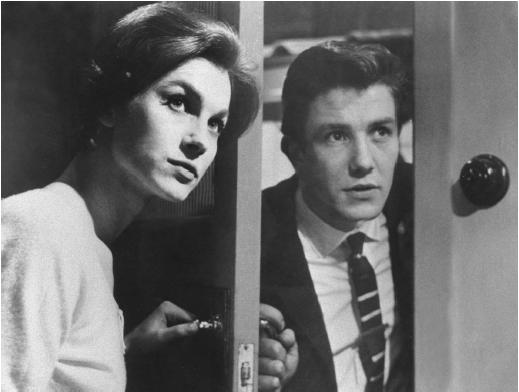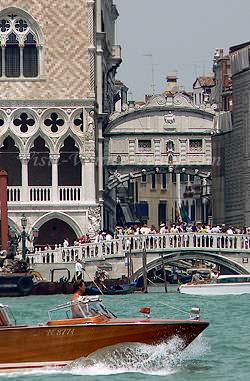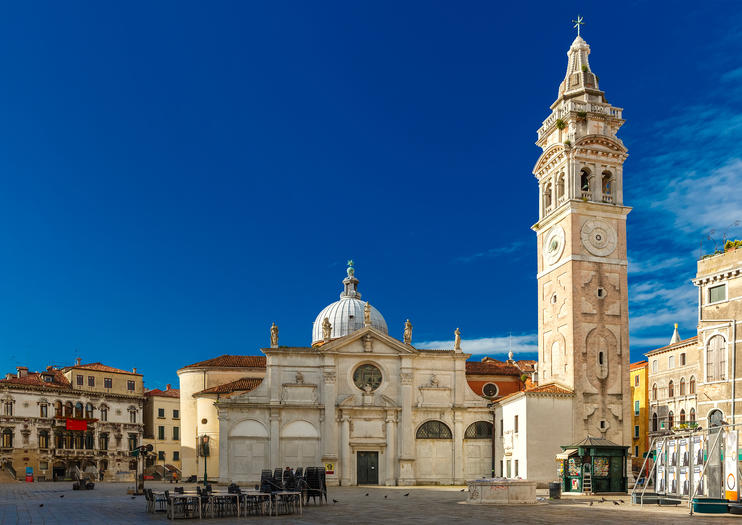I updated the layout of the blog in another attempt to embed some kind of visitor-tracking device in the sidebar, but once again it didn't work.
I am aware that this is the 18th post on Ruskin. There is a purpose, a grand project, an ambition of sorts at work in all of this that I believe is eventually become apparent to me, the resolving of which matter I am convinced will be the most important event to occur in my mental life in many, many years.
There is an interesting little section alluding to the associations and meanings excited by the words "Venice" and "Byron" in conjunction. Ruskin writes first that "the reader will find the influence of (the Bridge of Sighs) on the public mind ascribed chiefly to the 'ignorant sentimentalism of Byron'", and "that (Byron's) feelings about Venice had been founded on an extremely narrow acquaintance with her history," but then saves himself from too insufferable priggishness by admitting that, on his earlier visits anyway, "in spite of all my carefully collected knowledge, I still felt exactly as Byron did, in every particular...I had formed my own precious 'style' by perpetual reading of him, and imitation of him in various alliterative and despairing poems...for the love of Byron, I had run the risk of a fever in drawing the under-canal vaults, and the desolate and mud-buried portico of the ruined Casa Foscari." The argument however is that while Byron rather remarkably tapped into and brought into existence a whole cornucopia of exciting feelings and perceptions about Venice that appealed to the contemporary imagination, his seductive depiction of these perceptions and feelings was not merely inaccurate as to the Truth of the essences of these perceptions, but far inferior to them and infinity less whole, as we would realize had we still the capacity to understand the kind of mindset that informed their creation.
Later in the same chapter, Ruskin offers a course syllabus to an imaginary questioner who asks "But if I'm really good, and mean to try to see it (Tintoret's Paradise, in the Ducal Palace), what's to be done?":
"Well, you've got to read Homer all through, first, very carefully; then, with increasing care, the Prophet Ezekiel; then, also with always increasing care, the Gospel of St John, and then the Apocalypse..." These read over a thousand times or so and got pretty much by heart, "...they will lead you as far as, I will not say Tintoret, for you would have to spend another college-residence in actual painter's work before you could make much of him; but as far as Gentile Bellini and Giorgione, and the rest is according to the time and faculty you can dispose of..." It is somewhat rare that people give such specific direction as to what one needs to know utterly before it can even begin to be discussed whether he understands anything or not, so I always include such instances in my posts.
Picture 1--The Palazzo Contarini Fasan. There is a note on this further down the page. Once again I can get no control over the order in which the pictures arrange themselves.
 "...the greatest pictures represent men and women in peace, clouds and mountains beautiful. Never in the moral or the material universe does the great art of man acknowledge guilt, grief, change, or fear." This is a lead-in to a discussion of such a picture, the Castel-Franco altar, which I was going to put among the pictures on this post but it transferred as rather absurdly gigantic. The statement quoted is not something of the sort you usually hear anyone, other than perhaps Thomas Kinkade, asserting nowadays, and I suspect it would not be considered a morally acceptable viewpoint by many well-developed modern minds even if they were able to grant that in a certain historical or religious context it might have legitimacy. However, if the greatness of human art consists in grandeur of conception united with grandeur of execution, which certainly seems reasonable, it is likely that the art an age which does not conceive man, or existence generally, in some fairly intense degree of awe, will be ultimately impoverished.
"...the greatest pictures represent men and women in peace, clouds and mountains beautiful. Never in the moral or the material universe does the great art of man acknowledge guilt, grief, change, or fear." This is a lead-in to a discussion of such a picture, the Castel-Franco altar, which I was going to put among the pictures on this post but it transferred as rather absurdly gigantic. The statement quoted is not something of the sort you usually hear anyone, other than perhaps Thomas Kinkade, asserting nowadays, and I suspect it would not be considered a morally acceptable viewpoint by many well-developed modern minds even if they were able to grant that in a certain historical or religious context it might have legitimacy. However, if the greatness of human art consists in grandeur of conception united with grandeur of execution, which certainly seems reasonable, it is likely that the art an age which does not conceive man, or existence generally, in some fairly intense degree of awe, will be ultimately impoverished.He adds, "And the strength and joy, and height of achievement, of any group or race of mankind has, from the day of Christ's nativity to this hour, been in exact proportion to their power of apprehending, and honesty in obeying the truth of His Gospel." I thought this should be noted. I don't have anything to say about it. I don't pretend to have such developed apprehension, and I am not convinced that Ruskin had it in any such degree as he was striving for, but I certainly believe it is a real phenomenom that gives such people as have it real power.
Picture 2--Byron on an adventure, accompanied by the wit, the fun, the bravado, the sex, the title, and the associates that have given generations of phlegmatic library-bound drips far more enjoyment and consolation to read about than he had in the doing.
 My impression at the time apparently however was that 'He is in the end not really in touch with reality.'
My impression at the time apparently however was that 'He is in the end not really in touch with reality.'I also noted that 'The base mind has no conception of sin, no capacity for beauty.' I don't know whether Ruskin stated this, or I came upon it by deduction. Probably the former, as it is too neat a maxim for me to have come up with on my own.
Picture 3--Tintoretto's Slaughter of the Innocents. Referred to below.
 Good news! We have now finished the book proper and are now in Appendix 1 ("Grotesque Renaissance").
Good news! We have now finished the book proper and are now in Appendix 1 ("Grotesque Renaissance").There is a three page footnote in this section about the arrogance of Germans and their lack of any feel for as well as understanding of painting which must almost warm the heart of anyone who has had, as Ruskin himself presumably did, to suffer a representative of this people's pronouncing upon the value, or truth, or nature of any aspect of existence as if were the only and absolute word on the matter for all times and all peoples. I am sure however that his criticism and ridicule of the German mentality and approach to art would be dismissed by its intended targets as containing nothing of substance or concern in it. It would not sting them in the least; they would not understand what in it could possibly be supposed to. I will quote part of the section anyway, though, as it gets somewhat close to feelings I often have towards people generally, though this group includes more than a few Germans.
First he writes about the philosophical system of a German painting: "...its objective side, and subjective side; and mythological division, and symbolical division, and human and Divine division; its allegorical sense, and literal sense; and ideal point of view, and intellectual point of view; its heroism of graceful attitude and braided hair; its inwoven web of sentiment, and piety, and philosophy, and anatomy, and history, all profound: and twenty innocent dashes of the hand of one God-made painter, poor old Bassano or Bonifazio, were worth it all, and worth it ten thousand times over."--I am just setting up the rest of the quote here. If ever met an artist or intellectual with this precise a breakdown of his thought and work processes, I would doubtless be so overawed by the organization that I would scarcely be able to question whether whatever he did was really any good or not--such a distinction would not be for the likes of me to make--"...the worst result of the system is the intense conceit into which it cultivates a weak mind. Nothing is so hopeless, so intolerable, as the pride of a foolish man who has passed through a process of thinking, so as actually to have found something out. He believes there is nothing else to be found out in the universe. Whereas the truly great man, on whom the revelations rain till they bear him to the earth with their weight, lays his head in the dust, and speaks thence--often in broken syllables...I was once introduced to a German philosopher-painter before Tintoret's "Massacre of the Innocents." He looked at it superciliously, and said it 'wanted to be restored.' He had been himself employed several years in painting a 'Faust' in a red jerkin and blue fire; which made Tintoret appear somewhat dull to him." There is of course some truth in it; you are generally safe in assuming that most efforts, most people, amount to nothing much, either where you or the credit of the human race is concerned, though I must say I think this is not how the most truly brilliant and imaginative people view the world. I am not sure that Ruskin himself is that much more insightful than the people he is continually trashing. He pays a closer attention to certain things that are matters of interest to people of above average education and social stature--that is his most valuable quality--but his grasp of the larger part of Man, or Life, that is the portion of the great artist, is not, I think, very strong.
"I think that the central man of all the world, as representing in perfect balance the imaginative, moral, and intellectual faculties, all at their highest, is Dante; and in him the grotesque reaches at once the most distinct and the most noble development to which it was ever brought in the human mind." (In his youth Ruskin denoted Michelangelo and Tintoretto as the second and third greatest men Italy had ever produced, though in later years he denounced "the false reverence for Michael Angelo in which I had been brought up"). At the very top of such rankings all the contenders are so well-developed and excellent in so many facets of mental life that it seems rather nit-picking to me--to me--to determine that Dante is more supreme than Homer, or Socrates or Moses (I assume this is due mainly to his having been denied revelation of the Christian faith), or Thomas More or Samuel Beckett in any way that has any relevance to a minor person, but the sentiment of why anyone would be so designated is very well-expressed. Most people instinctively believe there is a proper, much higher, if not absolutely ideal, form of humanity towards which they ought to be ever striving, which would in turn suggests that human existence has a more ultimate purpose beyond its purely animal aspect, however unlikely a prospect that may appear to the rational mind. It is the great challenge and purpose of civilizations and cultures to define what these purposes are by the clearest and vivid, and in the way most harmonious to the soul, means possible.
 I wanted to take a little more time on the thought and writing in my posts, which have become sloppy and displeasing to me of late, but I also don't want to spend 30 hours writing up a sheet of little comments summarizing my deadbrain reactions to what are supposed to be provocative ideas.
I wanted to take a little more time on the thought and writing in my posts, which have become sloppy and displeasing to me of late, but I also don't want to spend 30 hours writing up a sheet of little comments summarizing my deadbrain reactions to what are supposed to be provocative ideas.Now we are in Appendix II ("Venetian Index").
The Palazzo Contarini Fasan (picture #1 this page) was, according to Ruskin, foolishly criticized in English accounts of foreign buildings for being ill-proportioned, "the simple fact being, that there was no room in this part of the canal for a wider house, and that its builder made its rooms as comfortable as he could, and its windows and balconies of a convenient size for those who were to see through them, and stand on them, and left the 'proportions' outside to take care of themselves..."
My observation was that the builder of this house was perhaps not a renowned genius architect, but a practical craftsman with enough absorbed culture from the surrounding environment to be able to produce beauty. I was thinking of this at the time because I had recently been to Woodstock, Vermont, which is a very posh town nowadays, in part because its center has some of the most architecturally renowned colonial-era houses in the United States. None of these houses were built by professional architects, but by regular citizen-amateurs of the village who had good groundings in geometry, Latin literature and philosophy, and the confidence that (along with obviously a general knowledge of the fundamentals of building construction) they were adequate to the task of not only building their own dwellings, but doing so in a manner that demonstrated a high degree of "civilization".
On Tintoretto's Paradise, which has already been reproduced and remarked upon in an earlier section: "The picture is on the whole wonderfully preserved, and the most precious thing that Venice possesses. She will not possess it long; for the Venetian Academicians, finding it exceedingly unlike their own works, declare it to want harmony, and are going to retouch it to their own ideas of perfection."





.jpg)






